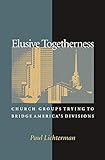Elusive Togetherness : Church Groups Trying to Bridge America's Divisions / Paul Lichterman.
Material type: TextSeries: Princeton Studies in Cultural Sociology ; 52Publisher: Princeton, NJ : Princeton University Press, [2012]Copyright date: ©2005Edition: Course BookDescription: 1 online resource (344 p.) : 4 tablesContent type:
TextSeries: Princeton Studies in Cultural Sociology ; 52Publisher: Princeton, NJ : Princeton University Press, [2012]Copyright date: ©2005Edition: Course BookDescription: 1 online resource (344 p.) : 4 tablesContent type: - 9780691096513
- 9781400842957
- Associations, institutions, etc -- United States
- Associations, institutions, etc -- United States
- Associations, institutions, etc. -- United States
- Religion and social problems -- United States
- Religion and social problems -- United States
- Small groups -- Religious aspects
- Social action -- United States
- Social action -- United States
- Voluntarism -- United States
- Voluntarism -- United States
- SOCIAL SCIENCE / Sociology of Religion
- 306.60973 22
- HN65 .L455 2005
- online - DeGruyter
- Issued also in print.
| Item type | Current library | Call number | URL | Status | Notes | Barcode | |
|---|---|---|---|---|---|---|---|
 eBook
eBook
|
Biblioteca "Angelicum" Pont. Univ. S.Tommaso d'Aquino Nuvola online | online - DeGruyter (Browse shelf(Opens below)) | Online access | Not for loan (Accesso limitato) | Accesso per gli utenti autorizzati / Access for authorized users | (dgr)9781400842957 |
Frontmatter -- CONTENTS -- TABLES AND FIGURES -- ACKNOWLEDGMENTS -- INTRODUCTION -- Chapter One. IN SEARCH OF THE SOCIAL SPIRAL -- Chapter Two. STUDYING THE SOCIAL SPIRAL -- Chapter Three. NETWORKERS AND VOLUNTEERS REACHING OUT -- Chapter Four. CRYING OUT: SOCIAL CRITICS -- Chapter Five. CHRIST-LIKE CARE: SOCIAL SERVANTS -- Chapter Six. A SOCIAL SPIRAL WINDS OUTWARD: PARTNERS -- Chapter Seven. DOING THINGS WITH RELIGION IN LOCAL CIVIC LIFE -- Chapter Eight. DOING THINGS TOGETHER: LESSONS FROM RELIGIOUS COMMUNITY SERVICE GROUPS -- Appendix I. THEORY AND EVIDENCE IN A STUDY OF RELIGIOUS COMMUNITY SERVICE GROUPS -- Appendix II. STUDYING CUSTOMS -- NOTES -- REFERENCES -- INDEX -- Backmatter
restricted access online access with authorization star
http://purl.org/coar/access_right/c_16ec
Many scholars and citizens alike have counted on civic groups to create broad ties that bind society. Some hope that faith-based civic groups will spread their reach as government retreats. Yet few studies ask how, if at all, civic groups reach out to their wider community. Can religious groups--long central in civic America--create broad, empowering social ties in an unequal, diverse society? Over three years, Paul Lichterman studied nine liberal and conservative Protestant-based volunteering and advocacy projects in a mid-sized American city. He listened as these groups tried to create bridges with other community groups, social service agencies, and low-income people, just as the 1996 welfare reforms were taking effect. Counter to long-standing arguments, Lichterman discovered that powerful customs of interaction inside the groups often stunted external ties and even shaped religion's impact on the groups. Comparing groups, he found that successful bridges outward depend on group customs which invite reflective, critical discussion about a group's place amid surrounding groups and institutions. Combining insights from Alexis de Tocqueville, John Dewey, and Jane Addams with contemporary sociology, Elusive Togetherness addresses enduring questions about civic and religious life that elude the popular "social capital" concept. To create broad civic relationships, groups need more than the right religious values, political beliefs, or resources. They must learn new ways of being groups.
Issued also in print.
Mode of access: Internet via World Wide Web.
In English.
Description based on online resource; title from PDF title page (publisher's Web site, viewed 29. Jul 2021)


